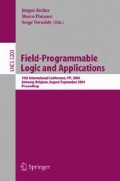Abstract
This paper presents a new data representation known as Dual FiXed-point (DFX), which employs a single bit exponent to select two different fixed-point scalings. DFX provides a compromise between conventional fixed-point and floating-point representations. It has the implementation complexity similar to that of a fixed-point system together with the improved dynamic range offered by a floating-point system. The benefit of using DFX over both fixed-point and floating-point is demonstrated with an IIR filter implementation on a Xilinx Virtex II FPGA.
Access this chapter
Tax calculation will be finalised at checkout
Purchases are for personal use only
Preview
Unable to display preview. Download preview PDF.
References
Constantinides, G.A., Cheung, P.Y.K., Luk, W.: Wordlength optimization for linear digital signal processing. IEEE Transactions on CAD of Integrated Circuits and Systems 22, 1432–1442 (2003)
Gaffar, A.A., Luk, W., Cheung, P.Y.K., Shirazi, N.: Customising floating-point designs. In: IEEE Symposium on Field-Programmable Custom Computing Machines (2002)
Inacio, C., Ombres, D.: The DSP decision: fixed point or floating? IEEE Spectrum 33, 72–74 (1996)
Oppenheim, A.V., Weistein, C.J.: Effects of finite register length in digital filtering and the fast fourier transform. Proceedings of the IEEE 60, 957–976 (1972)
Horrocks, D.H., Bull, D.R.: A floating-point FIR filter with reduced exponent dynamic range. In: IEEE International Symposium on Circuits and Systems (1992)
Wust, H., Kasper, K., Reininger, H.: Hybrid number representation for the FPGA-realization of a versatile neuro-processor. In: Euromicro Conference (1998)
Oppenheim, A.V.: Realisation of digital filters using block-floating-point arithmetic. IEEE Transaction on Audio and Electroacoustics 18, 130–136 (1970)
Author information
Authors and Affiliations
Editor information
Editors and Affiliations
Rights and permissions
Copyright information
© 2004 Springer-Verlag Berlin Heidelberg
About this paper
Cite this paper
Te Ewe, C., Cheung, P.Y.K., Constantinides, G.A. (2004). Dual Fixed-Point: An Efficient Alternative to Floating-Point Computation. In: Becker, J., Platzner, M., Vernalde, S. (eds) Field Programmable Logic and Application. FPL 2004. Lecture Notes in Computer Science, vol 3203. Springer, Berlin, Heidelberg. https://doi.org/10.1007/978-3-540-30117-2_22
Download citation
DOI: https://doi.org/10.1007/978-3-540-30117-2_22
Publisher Name: Springer, Berlin, Heidelberg
Print ISBN: 978-3-540-22989-6
Online ISBN: 978-3-540-30117-2
eBook Packages: Springer Book Archive

